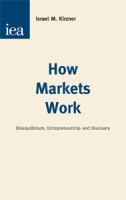1. Mainstream neo-classical economics focuses on already attained states of equilibrium. It is silent about the processes of adjustment to equilibrium.
2. Human action consists of ‘grappling with an essentially unknown future’, not being confronted with clearly specified objectives, known resources and defined courses of action as mainstream theory assumes.
3. Critics of the market economy find ammunition in neo-classical theory: they ‘merely need to tick off the respects in which real world capitalism departs from the requirements for perfectly competitive optimality’.
4. The theory of entrepreneurial discovery allows economists to escape from the ‘analytical box’ in which ‘choice’ simply consists of computing a solution implicit in given data.
5. An entrepreneurial act of discovery consists in ‘realising the existence of market value that has hitherto been overlooked’. Scope for entrepreneurial discovery occurs in a world of disequilibrium – which is quite different from the equilibrium world of mainstream economics where market outcomes are foreordained.
6. Entrepreneurial discovery explains why one price tends to prevail in a market. Though new causes of price differences continually appear, entrepreneurs exploit the resulting profit opportunities and produce a tendency towards a single price.
7. Only with the introduction of entrepreneurship is it possible to appreciate how markets work. Without entrepreneurship, there would be no market co-ordination.
8. So-called ‘imperfections’ of competition are often ‘crucial elements in the market process of discovery and correction of earlier entrepreneurial errors’.
9. Advertising expenditures, for example, are means of alerting consumers to ‘what they do not know that they do not know’. Anti-trust laws may hamper market processes and prevent competitive entry to markets.
10. Entrepreneurial profit, far from generating injustice, is a ‘created gain’.
It is not ‘sliced from a pre-existing pie – it is a portion which has been
created in the very act of grasping it’.
Search LPP
-
A selection of our books
- Catholic Social Thought, the Market and Public Policy: Twenty-First-Century Challenges
- Money in the Metaverse: Digital Assets, Online Identities, Spatial Computing and Why Virtual Worlds Mean Real Business
- The Climate Majority Project: Setting the Stage for a Mainstream, Urgent Climate Movement
- Assessment and Problem-Based Learning in the Law Curriculum: The PREPS Framework
- Towards a Humane Refugee Policy for the European Union
- Europe and the War in Ukraine: From Russian Aggression to a New Eastern Policy
- Notre Avenir Européen
- Unsere europäische Zukunft
- Nuestro futuro europeo
- Our European Future
Services


